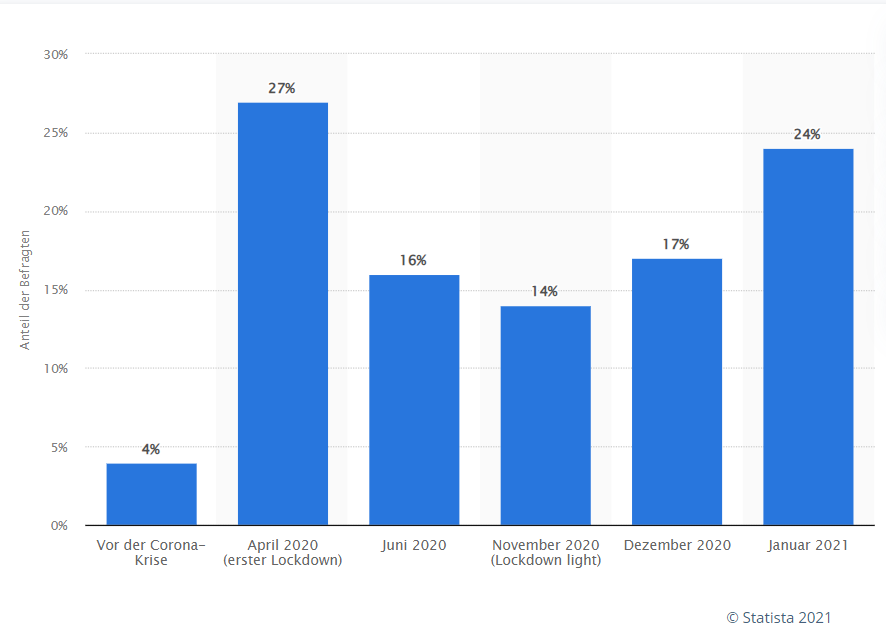
Home office = workplace of the future?
Since the beginning of the pandemic and especially in the last weeks, when the pandemic statistics were higher than ever before, more and more people decided to work from a home office. How does everyday life compare to the usual office routine, what is easier, what is more difficult? Who has a choice to work in a home office and who must? And what will change when pandemic is over? An empirical survey on the current status of home office implementation in Germany between ifo and infas shows that home office is one of the most effective tools against the spread of the virus. Employees with presence work complain 4 to 8 times more often about a COVID-19 disease. Other numbers also support the home office. A 1 percentage point higher regional home office rate can be associated with a 4% to 8% lower regional infection rate!
How do we implement home office at MS POS?
Fortunately, we were already quite well equipped technically before the pandemic, and thanks to our IT manager Niels Wosnitza , we were in an excellent position. So home office was not a foreign concept for us. Nevertheless, the Corona situation gave us another push and made additional home office workplaces necessary, such as in administration or support. As an IT service provider, we are now in the fortunate position of being able to give our employees freedom of choice when it comes to selecting their workplace. However, to ensure that this is possible under the generally known distance and hygiene rules, we make sure that the permissible number of employees per office space is strictly obeyed. To ensure this, each employee enters his or her attendance days per month in advance. The aim is to give everyone the chance to work 2 days per week in the office and 3 days from home. This way, we would like to minimize the risk of infection as much as possible, nevertheless strengthen interpersonal contacts and, if possible, convey a feeling of "normality". Nevertheless, we cannot avoid discussing the pros and cons from time to time and would like to see a more relaxed working environment overall.
Advantages of home office
Time savings. Those who work in a home office save at least the trip to the office and back home. No traffic jams, no crowded buses or trains, and the environment thanks you, too!
Flexibility. The advantage of flexibility depends on the industry and profession, but you are no longer so strictly bound to office hours. Private appointments such as doctor's appointments, tradesmen's appointments or children's school appointments are easier to implement, as the missed time can be made up later.
Less stress. Annoying commutes via crowded highways, overcrowded buses and delayed train connections are eliminated. There's also no more noise in the office and the constant ringing of colleagues' phones - almost idyllic.
Cheaper. 20 workdays a month means 40 fewer trips from home to the office and back, so it adds up.
Work-life balance. Especially employees with children have the security of being on site quickly if they are needed or care becomes difficult.
Disadvantages due to home office
Lack of social contact. Whether it's during a coffee break or at the cafeteria table, the small chat with colleagues is unfortunately eliminated. Occasional telephone conferences unfortunately cannot replace face-to-face contact.
Distractions. Working in a home office requires discipline. There are many distractions, be it the children, the pets, the parcel service or the handyman. You have to set yourself clear rules here, otherwise productivity suffers.
Lack of motivation. Colleagues aren't just there for coffee chats, but can also help keep motivation up. The lack of team spirit in the "isolation" at home can have a serious impact on motivation.
Prejudices against home office. "People don't really work in the home office." "People are just lazy." Certainly, there are employees who find it more difficult to work independently. That's why it's important to agree on clear tasks and goals and to stay in regular contact.
Work-life balance. Discipline is required here to draw a clear line between work and private life. Even if the computer or laptop are always within reach (and visible) - after work is after work.
What the legislator has regulated - the home office obligation
"In the case of office work or comparable activities, the employer shall offer employees the opportunity to carry out these activities in their homes if there are no compelling operational reasons to the contrary. The employees shall accept this offer unless there are reasons on their part to the contrary." - BMAS
If implemented, the obligation therefore applies to employers and employees. The employee can refuse to work in a home office if, for example, the technical or spatial conditions are inadequate. It should be noted that the requirements of the Occupational Health and Safety Act and the Working Hours Act also apply in the home office and that the requirements of the EU Data Protection Regulation must be complied with. The employer is responsible for health and safety at work, but this does not mean that all necessary work equipment must be provided. An individual agreement must be made here.
Numbers, data, facts

It is only since the pandemic that the home office has been offered more and more by companies and has proven its value. A statistic from early 2020 shows a significant 23% increase at the start of the first lockdown. While the numbers fluctuate depending on the current status of the infection event, a change in the work environment is definitely evident. It is estimated that currently about 56% of all employees in Germany could work full-time or part-time in a home office. So there is still a lot of room for improvement.
Remote working has a lot of support in Germany. According to a 2020 study , about 81% of respondents on the topic of "Attitudes toward the right to home office in Germany 2020" were "very much in favour" or "somewhat in favour." So one could assume that even after the pandemic, telecommuting will remain in trend. We are curious about the figures for 2021!
And the future?
Home office is a lucrative work model for employers and employees alike. Employers can save significantly on office maintenance costs, while employees save a lot of time and money on commuting. It's certainly not for everyone, but expect job postings with flexible workplace models to increase. With the pandemic as a trigger, the modern workplace could undergo a permanent transformation. Legislators will also have to comply with the new realities. The concept is in place and just needs to be refined. We are keen observers!

